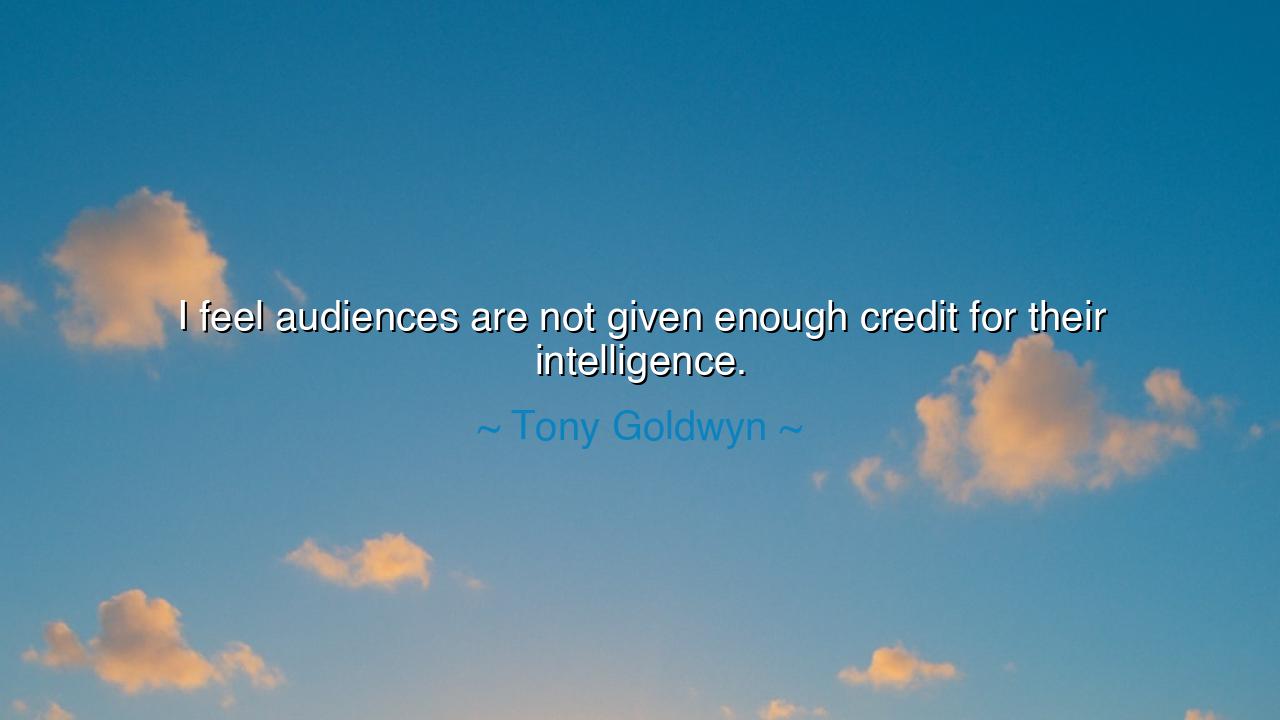
I feel audiences are not given enough credit for their






The words of Tony Goldwyn, spoken with quiet defiance and reverence for the people, ring as a challenge to all who create, teach, and lead: “I feel audiences are not given enough credit for their intelligence.” Beneath these words lies a deep and timeless truth — that the spirit of mankind, though often underestimated, hungers for depth, for truth, and for meaning beyond the surface. Goldwyn’s declaration is not merely about entertainment or art; it is about faith in the human mind, about trusting that within each person resides a spark of understanding waiting to be awakened. His words remind us that to speak to the masses is not to lower the light, but to lift all hearts toward it.
From the earliest days of civilization, the storyteller was the keeper of wisdom and the mirror of the people’s soul. The ancients did not simplify their tales for the crowd; they wrapped them in poetry, mystery, and moral struggle, trusting that the listener would find the truth through reflection. When Homer recited the Iliad, he did not fear that his audience would fail to grasp the sorrow of Achilles or the pride of Agamemnon. He believed that even the farmer and the fisherman could feel the pulse of destiny within those verses. Goldwyn’s words echo this ancient trust — that the human heart is wiser than we think, and that even those who seem ordinary are capable of perceiving greatness when it is spoken with honesty.
Consider the tale of Charlie Chaplin, the silent poet of cinema. In an age when film was young and words were few, he dared to weave profound truths into comedy. In Modern Times, he showed the dehumanizing weight of industrial life; in The Great Dictator, he spoke courageously against tyranny with nothing but the power of expression and truth. Many warned him that audiences sought only laughter, not moral fire. But Chaplin trusted the intelligence of those who watched. And when he spoke the closing speech — that plea for kindness and freedom — the world listened. His art proved that audiences crave meaning, not mindless distraction, when they are treated with respect and courage.
Goldwyn’s lament, then, is a cry against the arrogance of those who underestimate others. Too often the powerful, the creators, the teachers, believe that to reach the people they must simplify, dilute, or disguise truth, as though the human soul were incapable of bearing the weight of thought. Yet history shows the opposite. The greatest works — from Shakespeare’s tragedies to Martin Luther King Jr.’s sermons — endure because they refused to condescend. They demanded understanding, and in doing so, they elevated their audiences. When we challenge the mind, we honor it. When we trust others to think, we teach them to soar.
In the halls of ancient Athens, Socrates walked among the common people, questioning, provoking, awakening. He believed that wisdom lived not only in scholars, but in every person who dared to ask “why.” His faith in the intelligence of his audience was so great that he risked his life for it. Even when condemned to death, he did not recant; he chose truth over comfort, trusting that future generations would understand. His life is a living echo of Goldwyn’s words — that to respect the intelligence of others is to plant seeds that may bloom long after one’s voice has faded.
Let this teaching be a lamp to those who speak, write, or lead. Do not fear the depth of your ideas, nor assume others cannot follow. Whether you are an artist, a teacher, or a parent, know that within every listener lies a soul capable of wonder and reflection. Speak truth, not for applause, but for awakening. Challenge your audience to think, to feel, to question — and they will reward you not with comfort, but with growth. To underestimate people is to rob them of the chance to rise.
Thus, the lesson of Tony Goldwyn’s words is one of trust and courage — trust in the wisdom of others, and courage to create honestly. For when we speak to the highest in people, we call forth the best in them. The storyteller of today must remember what the ancients knew: that the crowd is not a beast to be fed with noise, but a garden to be tended with truth. Honor the intelligence of your audience, and you honor the divine spark within humanity itself.






AAdministratorAdministrator
Welcome, honored guests. Please leave a comment, we will respond soon